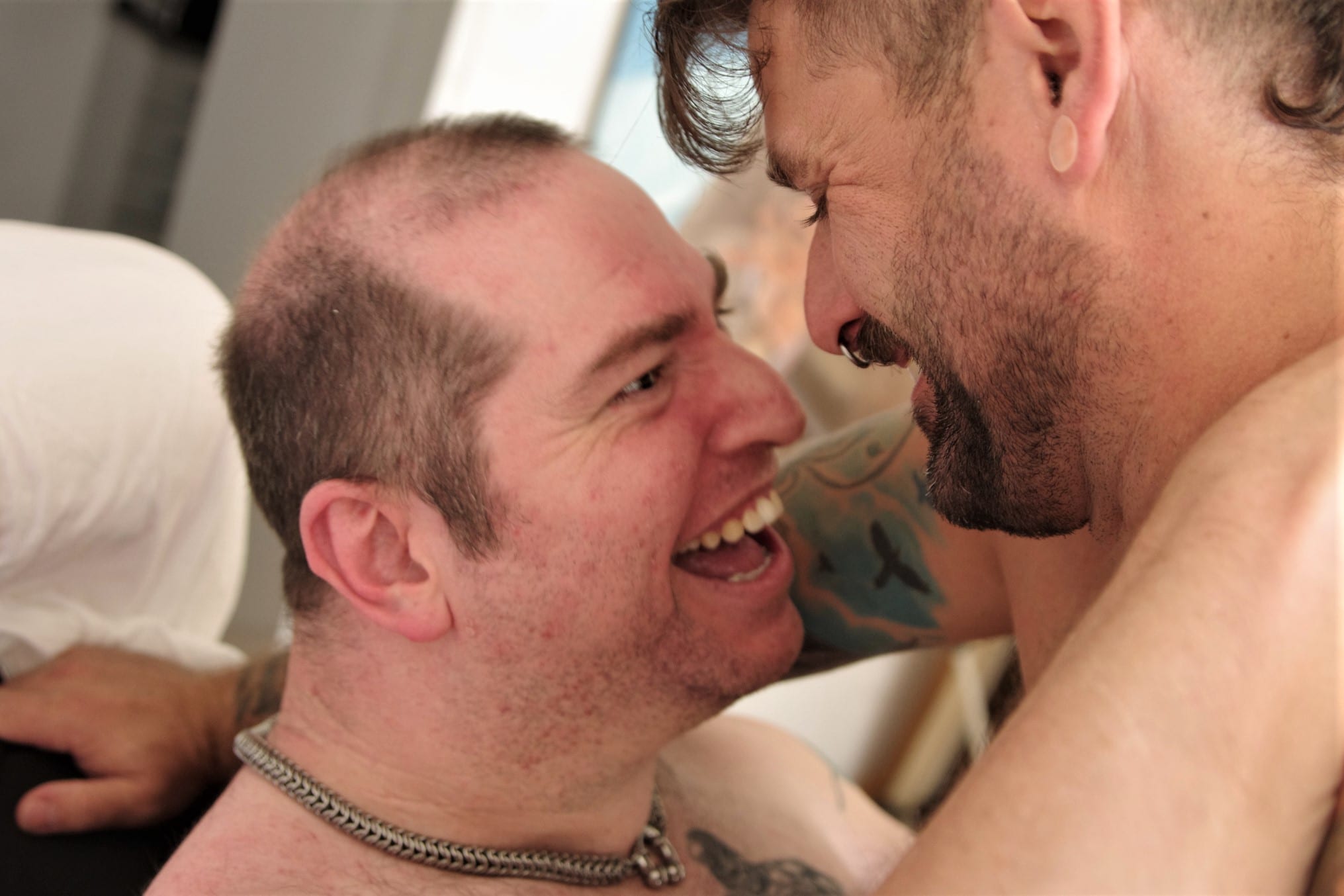“Knowing that I am just as sexual as the rest of the LGBTQ2 community but don’t have access to my sexuality the way that most do is frustrating,” Andrew Gurza says. Gurza, a Toronto-based disability awareness consultant and host of the Disability After Dark podcast, is an outspoken advocate who works toward normalizing sex for people with disabilities—a seemingly obvious sentiment that tends to be ignored by society at large.
His message is simple: Sex is for everyone who wants it, and what we crave and require from a sexual partner varies by individual. For some people with disabilities, it can require additional assistance. “I require help getting in and out of my chair, getting undressed and cleaning up prior to sex,” Gurza says. “I even require help getting positioned in certain ways for the type of sex that I want to have.”
Living in Toronto with spastic cerebral palsy, Gurza, a powerchair user, is an outspoken, sex-positive queer man who says it’s not his disability that makes sex difficult (since he can still achieve an erection and climax without issue). Rather, it’s the ableism he encounters on a near daily basis.
“Trying to meet and tell people that I’m as sexually viable as the rest of the queer community can be difficult,” Gurza says, adding that he can’t even get into most queer spaces in the city since they aren’t wheelchair accessible. “Knowing that I’m just as sexual as the rest of us in the community but not having access to my sexuality in the way others are is what’s most difficult.”
Years ago, after experiencing a year-long dry spell, Gurza recalls being repeatedly confronted by a particular online ad for an escort service. It always piqued his interest, but he ignored his impulse to click on the ad out of fear that he was not considered a “typical” client. Eventually, his mounting sexual frustration took over and Gurza clicked on the ad; he was presented with an expansive gallery of glorious hunks for hire.
“They were the type of men I would never get to talk to in my mind because I’m a disabled person,” Gurza says. After a few minutes of excited browsing, he happened upon a muscular, Tom of Finland-type leatherman by the name of Jon Shield. He clicked on the profile and asked if this mystery man had ever worked with a disabled person before. He said no, which excited Gurza. The two have been working together ever since. Over the past four years, Gurza has been able to show Shield what his specific sexual needs are—and Gurza is now having the best sex of his life.
“There’s something really sexy about being someone’s first disabled lover—it’s so powerful.”
“There’s something really sexy about being someone’s first disabled lover—it’s so powerful,” Gurza says. “It’s really nice to be with somebody who wants to learn, and we have such an intimate understanding of each other now. He knows exactly what to do, and I fully trust him to take me out of my chair, lift me into bed and do all the things that I require. I’m not afraid to tell him parts of my disabled experience that he may need to help me with. I feel safe with him.”
Sex work greatly impacts Gurza’s outlet for sexual expression. “I’m a very sexual person, but I often don’t get to express it because I’m often touched by [straight social] workers and don’t get to be a queer man and talk about dick, fucking and all those fun things,” he says. “I can’t show my sexuality as freely as I’d like to. I can’t start an OnlyFans and be independent. I can’t take a selfie feeling sexy when I want to. So when I get to be with a sex worker, I finally get to share [those things] with somebody which, for me, is really important and really powerful.”
Shield works with Gurza as he does any able-bodied client, using his time to learn Gurza’s body and cater to his individual needs and desires. Both he and Gurza agree that disability is not a prevailing factor in their relationship, which has become increasingly personal over the years. “Andrew and I chat regularly,” Shield says. “If he’s having a down day, he reaches out and we talk things out. Sex work isn’t all about just getting that person off, it’s about creating a bond and having them feel comfortable letting themselves go.”
When Shield and Gurza show up at their designated meeting spot, the two will catch up and joke around while Shield helps Gurza into his desired position. “We generally use his hoist to get him onto his bed and comfortable,” says Shield, who now works with three or four disabled folks. After their session, the two will clean up, chat and sometimes go for coffee.
Gurza credits sex work for making his sex life as phenomenal as his fantasies. “It allows me to have hot sex,” Gurza says flatly. “There are moments where I’ll say, ‘I want to fuck and have a really hot time with you today.’ I get to be slutty and dirty and fun and sexy and all the things that I am inside that I often don’t get to express. I think that’s what’s so important about having a disability, not turning everything into a type of therapy.”
Medically assisted sex workers—sometimes known as surrogate partners—are another option for people with disabilities as well as folks who experience difficulty having sex in a conventional sense. A surrogate partner is prescribed by, and will often work in tandem with, a therapist when assisting a client, creating experiences designed to build skills in physical and emotional intimacy. Therapist consultations are also interwoven to facilitate understanding and change. If genital-on-genital contact occurs, it is often a minor part of the therapy—and therein lies the problem, at least for Gurza.
“I want to have spontaneous sex with a hot dude and that’s why I felt it was okay to just hire a sex worker instead of a sexual surrogate prescribed by a doctor,” Gurza says. “I think sexual surrogates are great and I think that they provide an important service, too, but I felt that a sex worker was the right avenue for me.”
Surrogate partner Mark Shattuck, media chair of the International Professional Surrogates Association, likens sex work to visiting a restaurant you enjoy over and over again, whereas working with surrogate partners is like attending a cooking class and learning to cook; one offers instant gratification while the other is about providing the tools to achieve that gratification. Depending on the needs of the client, sessions with a surrogate partner can become physical, even intimate.
Similar to Shield, Shattuck has worked with a client with cerebral palsy. Shattuck explains his client hadn’t had sex in 25 years and their sessions mostly consisted of finding effective sexual positions for orgasm. Shattuck admits that not everyone needs that kind of Sex 101 work. “I think sex work is a wonderful option for people with disabilities looking to get off since surrogate partners can be expensive because they’re hiring both the surrogate partner and the therapist,” he says.
Gurza also recognizes that oftentimes people with disabilities live in poverty and don’t have access to a lot of money. It’s part of the reason why he believes governments should fund sex work for people with disabilities—something he’s very passionate and vocal about.
“We need to talk about these things so that ableism is openly discussed in the LGBTQ2 community—and all communities really—in terms of sexuality, so that sex work can feel like an option if you want it to be one,” Gurza says. “We also need to make clear that if a sex worker works with a disabled person, they aren’t a saviour. They aren’t doing something better or worse by working with a disabled client. They aren’t saving them from their sad little lives. They are simply facilitating a need and from that need, awesome things can happen, and awesome things can grow.”


 Why you can trust Xtra
Why you can trust Xtra


